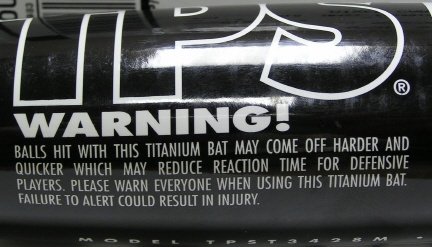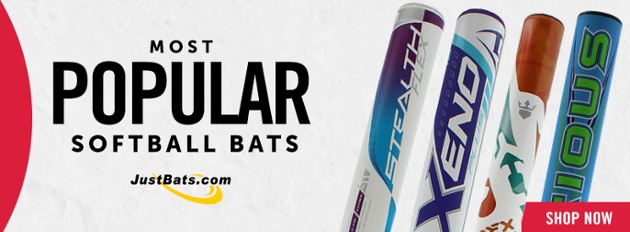In 1993, the slow pitch softball world welcomed titanium bats. Vendors, such as Easton, Louisville Slugger, and Worth, all produced bats made of this dense metal to the delight of softball players.
But, given performance standard and safety issues, the bats became obsolete in a short period. However, despite the short existence, titanium softball bats impacted softball. JustBats.com details the ins-and-outs of titanium bats and how they helped to change the game.
- Titanium made barrel.
- $500 retail price.
- 5,000 were produced, and then the Typhoon II was produced as a follow-up.
While the Easton Titanium Typhoon was the first titanium bat on the market, Worth developed the first titanium bat in 1988. In fact, Worth developed, produced, and tested their Titanium Ti51 model and only started selling it in 1993 when Easton introduced their bat. Worth's slow pitch bat had an aluminum knob welded to the handle. This was also a popular bat -- $700 retail and only 3,000 created.
>>> 5 Best Illegal Bats of All-Time <<<
Louisville Slugger's titanium bat (Louisville Slugger TPS Titanium) retailed for $800 and was also produced in limited quantities. All three manufacturers were aware of the effects of titanium metal, so each bat carried the following warning:

WARNING! Balls hit with this titanium bat may come off harder and quicker, which may reduce reaction time for defensive players. Please warn everyone when using this titanium bat. Failure to alert could result in injury.
Remember, this was in 1993 before BBCOR and USABat Standard. But, since the titanium bat was the first major bat progression since 1972's composite bat introduction, the softball governing bodies took notice.
3 Major Impacts of Titanium Bats
While titanium bats were only around for a couple of seasons and not many were produced, their implications on softball still remain.
- Bat Evolution: development of titanium bats started in the 1980's, as bat manufacturers sought to create bats with greater trampoline effect. The thinner they built the softball bat walls, the faster the bat, and the better the ball came off the bat. DeMarini accomplished this with the creation of the double-walled aluminum bats, but titanium bats did this on a durable single-walled bat. Titanium bats pushed the envelope, and in doing so it allowed manufacturers to take some chances on what future bats could or couldn't do.
- Better Bat Regulations: Titanium bats had safety concerns. Players could hit balls 10+ mph faster off the bat than an aluminum bat. This increased the chance for injuries and less reaction time from defenders, so the United States Slowpitch Association (USSSA) and the Amateur Softball Association (ASA) took notice. Short term was a ban on all titanium bats, but then came better bat performance standards, such as the ASA 2004.
- More Manufacturer Competition: Only three vendors produced titanium bats. However, the demand for the bats signaled an opportunity in the market to create high-performing bats. Once titanium bats were banned, other vendors looked for an edge, and that resulted in composite slowpitch bats like Miken's Ultra and the Worth Legit.
Titanium bats were the first softball bats to hit batted-ball speeds of 100+ mph. While some high-performing bats have been produced with similar results, they have been subsequently banned from play. Still, composite bats have surpassed what titanium bats had achieved.
Vendors have attempted to replicate titanium bats in past years (ex. Toloso Maximus). However, the bats remained banned in all Leagues.
What do you think? Did you ever swing a titanium bat? Would you?
Meanwhile, if you ever have any baseball bat or softball bat related questions, don’t hesitate to give our Bat Experts a call at 866-321-2287 , send us an email at experts@justbats.com or click here to live chat with our bat experts. And remember, we are always here for you from Click to Hit!







